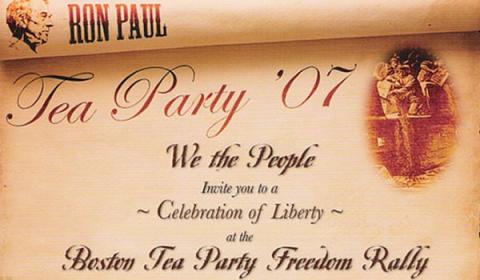In 2007, the modern tea party movement took shape, in a vastly different form than it now presents itself. Spurred by an impending recession, a government overrun by deception and corruption, and an unprecedented expansion of government under eight years of “conservative” leadership, the first modern day tea partiers had positive causes of action: honesty, respect for the rule of law, and protection of the rights of the smallest minority; the individual.
In late 2007, on the anniversary of the original Boston Tea Party, positive protestors laid hope in a solution. In a 24 hours period, in concert with symbolic and peaceful re-enactments of the Boston Tea Party in over 50 cities across the country, energetic tea partiers dumped over 5.2 million dollars into a long-shot presidential campaign to support a candidate that embodied honesty, respect, and sincerity in the pursuit strict constitutional leadership. The goal: to entrust our highest office to a man of principles, who would be shackled by a devotion to the constitution, rather than obligations to special interests.
I am proud to have been a participant in that tea party. In witnessing the tens of thousands of “patriots” that peacefully marched through the streets and donated extravagantly to a candidate relegated to a status of “darkhorse” by the mainstream, my respect turned to passion. I was convinced that the average American was beginning to see through the veil of scripted partisan sermons, designed to coddle fears and perpetuate the superficial battle between a “left” and “right”.
Over the next year, I harvested an addiction to contrarianism. An incessant hunger for serious political debate, fueled by coffee, cigarettes and eighteen-hour workdays changed my world. I was a dark-horse political enthusiast, with blinders on.
Then, in mid-February of 2009, Rick Santelli gave a nowinfamous rant on CNBC, calling for a modern day “tea party” in July. Immediately, my business partner and I set up on online tea party website. Within days, we received tens of thousands of e-mails and passionate pleas for government accountability. Our vision was to change the political debate focused on general divisions to one centered on specific solutions. We asked our supporters to question party-line politicians and demand that our leaders take a more independent and reasoned stance on the issues facing our country.
In short time, desperate partisans were soiling the sheets. Knowing we had neither the financial means nor man-power to out-publicize political perverts, I was never-the-less convinced that this independent movement would not be overrun by golden idols. I wrote to our supporters, asking them to be weary of old Republican figureheads like Newt Gingrich and current political strategists Patrick Leahy, hiding their identity behind make-shift “grassroots” websites. I was hopeful that the same talking heads, like Hannity and O’Reilly, that asked us to bend over blindly to past leaders would not have enough credibility to grandstand in front of an independent-minded movement.
At some point, reality began piercing my passion. The tea party boat started becoming a wagon of whiners. Propelled by the moving mouths on TV and the talking heads of such ironically named organizations such as the “American Family Association,” the movement lost its focus. No longer were tea partiers upset with the bipartisan corruption in Washington D.C., they are mad at the socialists communists Hitler-like Democrats. No longer did Constitutionalism mean respecting the rule of law, it meant Obama is not really our president. A movement founded on the principles of independent analysis, it has become a yelling fest for punch-drunk cynics armed with incoherent talking points.
Slowly, I’ve lost some of my unrealistic idealism. As I pull back the blinders, I try to look at the tea party from the eyes of an outsider, the average American. What I see is a bunch of people reciting partisan political sermons, coddling fears, and perpetuating a superficial battle between “left” and “right”; drowning the well intentioned idealists that remain.
As the battle rages, I have more faith than ever that an independent revolution will come. When the absurdity of our political process rises to the point where tea bags become a right wing rally cry and the left still manages to drop in the polls, there is a growing opportunity for the increasingly disenchanted to drive a stake right down the middle.
